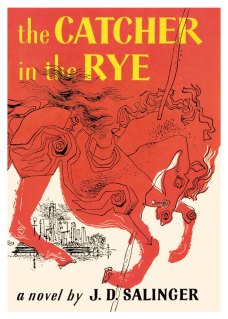“I’d just be the catcher in the rye and all. I know it’s crazy, but that’s the only thing I’d really like to be. I know it’s crazy.”
This book was unlike any other book Ive read because it felt like the author was talking to you. If Holden, the main character, did not stop where he did, I would have continued reading it even if it took volumes to finish because of the way he narrated his life. As I was reading the book, I could imagine myself being a bystander of the scenes. The usage of casual slang and obscene profanities made the book feel more natural too. I was quite comfortable with it. It was very fitting in some situations which added to the humor and character building as well.
It was such an ‘English’ book and I was confused why the title seemed so Chinese-like with the red horse background and all (according to a friend of mine) But it turns out the title Catcher in the Rye symbolizes something and holds meaning worth its name. Salinger presents a realistic view of life through the main character who was the kind of person who wondered where the ducks went during winter and who thinks talking to famous people isnt really a big deal. The story is told in the point of view of a 16 year old boy, Holden Caulfied, who is expelled from his school, Pencey. But he cannot go back home as he does not want his parents to find out he was kicked out. And so he loiters around trying to fill up his life to make it more enjoyable in the streets of New York. He doesnt have a dream nor passion to become or do something. But he tries in every way to spice things up. Then he calls his ex girl friend, he gets in a fight with his friend, he gets in a fight with unpleasant taxi drivers, he gets robbed, he meets nuns at a restaurant, he gets drunk, he even gets into conflict for incidentally involving with a prostitute at one point. But the meaning of the title still does not reveal at this point. Towards the end as he is drunk, he sneaks into his house late at night and meets his sister, Phoebe, whom he is quite fond of. They have a touching reunion. During their conversation, Phoebe, who is young but smart, realizes that his brother became a dropout. She asks him one thing he likes the most or to be the most to which he answers(after quite a lot of contemplation)that he simply wants to be a catcher in the rye, chasing children with the company of nature and having nothing to worry about.
This book sort of made me realize that no matter how many people you meet in this world and even in the busiest crowds you can still feel alone. And the comfort you are looking for may actually just be right in front of you, so you dont have to look that far. The part that struck me in the most throughout the whole book was when Holden was trying to have intellectual conversation with people. But even his smartest friend wasnt able to satisfy what he wanted to have. At the end I realized, in his conversation with Phoebe, that it wasnt intellectual conversation he wanted. He just wanted to be understood. And Salinger portrayed this theme very well. He could have just made Holden say ‘I wanted people to understand me’ but no, he made the readers find out through the events and in the experiences of the character.
Some may think of it boring because it can strike as a series of random events but I think the rather arbitrary events were what made the book so special at the same time.




